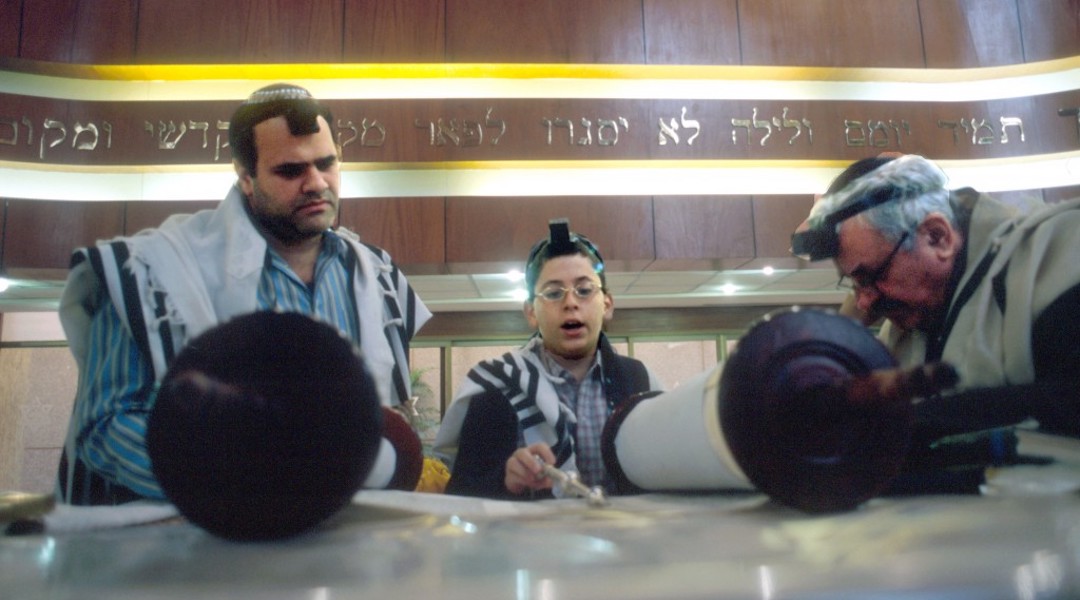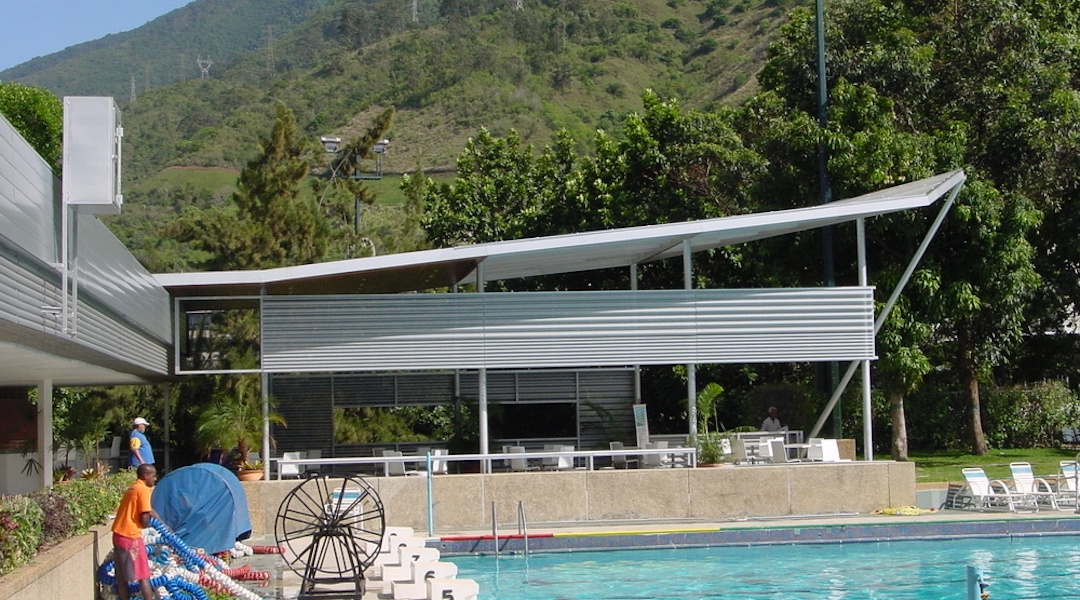Venezuela has one of the world’s most tight-knit Jewish communities. They are still mourning their Surfside victims.
Students at the Colegio Moral y Luces Herzl-Bialik Jewish school in Caracas, Venezuela. (Nuevo Mundo Israelita)
Published October 12, 2021
CARACAS, Venezuela (JTA) — The Champlain Towers building collapse in Surfside, Florida, impacted a range of communities whose members lived in the diverse Miami-Dade area: immigrants from across Latin America, Jewish retirees from the Northeast, Jews from Puerto Rico.
One of them still feeling the most pain months later is the Jewish community of Caracas, Venezuela’s capital city.
In the wake of the collapse, seniors Christina Beatriz Elvira and Leon Oliwkowicz, both Venezuelan Jews, were among the first victims to have their remains recovered. Then came the bodies of Luis Sadovnic, Moises “El Chino” Rodán and Andres Levine. The three young men, who were all in their 20s, were raised in the small Jewish community surrounded by the lush El Ávila National Park in the heart of Caracas.
ADVERTISEMENT
Miami had become an economic stepping stone and new home for the young Venezuelans, just as it had for hundreds of other community members over the past decade.
Many Jewish communities in Latin America are described as “tight knit,” but Venezuela’s is unique in the region for its intense closeness. Here everyone is part of one extended family — even though Venezuelan Jews often use the Hebrew word “kehilla,” for community.
Few agreed to speak about the tragedy in its aftermath, or months later. They were instead focused on providing moral and financial support to family members of the victims.
But those who did speak to the Jewish Telegraphic Agency emphasized how strongly the deaths of their fellow community members reverberated throughout the country.
ADVERTISEMENT
“The entire community feels this tragedy in the most innermost core of our beings,” said Miguel Truzman, vice president of the Confederation of Jewish Associations of Venezuela, known by its Spanish acronym CAIV. “They were boys that we watched grow up; the whole community is deeply traumatized and devastated by this tragedy.”
The Caracas area’s Hebraica Jewish community center — the community’s only social, cultural and religious center, which serves as a country club, sports facility, elementary school and meeting hub — put out a statement in July saying the Surfside events “will undoubtedly shape the rest of our lives.”
Besides having shared a joint address at the Champlain Towers South condo building, the three young Venezuelans had another thing in common before moving to the U.S.: They all attended Colegio Moral y Luces Herzl-Bialik, a private Jewish high school located in the San Bernardino neighborhood east of the city, housed inside the Hebraica center.
Founded in 1946 by Ashkenazi emigres after quick growth in the community’s population, the school has since served as a common link for almost all Venezuelan Jews, despite their religious denomination or ethnic background. It is one of the main pieces that contribute to the community’s sense of unity.
“The Venezuelan Ashkenazim allowed the Sephardim to study in the school without the slightest problem. If you go to another Latin American country, like Mexico — or even around the world — every community, depending on their origin, has their own school,” said Sami Rozenbaum, journalist and current editor-in-chief of Nuevo Mundo Israelita, or New Israelite World, the community’s weekly newspaper.

A young boy reads from the Torah at the Magen David Synagogue in Caracas. (Courtesy of Hebraica Caracas)
A history of belonging, an uncertain future
The majority of the Jews left in Venezuela are either the children or grandchildren of European or Moroccan immigrants. Their ancestors mostly emigrated from the late 1930s through the late ’60s. Newcomers quickly assimilated into mainstream Venezuelan society and never felt like outsiders, since the country was an ethnically and religiously diverse melting pot at the time. Antisemitism and racism were rarely major concerns for the community, and unlike Paraguay, Argentina, and Chile, the country has no history of harboring Nazi fugitives.
The Jewish newspaper, founded by Moisés Sananes in 1943 as Mundo Israelita (Israelite World), was the community’s first systematic effort to unite both its Ashkenazi and Sephardic immigrants, before the Bialik school.
“Our community stands as a reference point in the world because of its integration. We are fully united. Here there’s no distinction between who’s from Ashkenazi or Sephardi ancestry. The only separate components are the synagogues and the religious and cultural traditions of each group,” Rozenbaum said.
Although the community was officially established in the mid-19th century, it wasn’t until 1939 that the country’s first synagogue, El Conde Synagogue, was built. The temple, however, wouldn’t last long, as the government at the time approved a series of urban restructuring projects in 1954, forcing it to be demolished. In 1963, the Sephardic community in Caracas inaugurated the Tiferet Israel Synagogue, the city’s largest to date.
In recent years, the community has seen several of its members leave, as a stagnant socioeconomic and humanitarian crisis continues to drive a large-scale exodus from the oil-rich country. From a population peak of 25,000 in the early 1990s, Venezuelan Jewry has dwindled to fewer than 6,000 members, a decrease of 70%.
The country’s hyperinflation, rampant violence, hunger and deepening poverty have forced many into a new diaspora. Nearly all of these Venezuelan Jewish immigrants have settled in the United States, Israel, Mexico and Panama.
Those who remain are predominantly Orthodox and live in Caracas, sometimes depending on each other for survival. Since there are so few left, nearly everyone in the community knows each other by name. Most of them consider themselves staunch Zionists.
The regime of the populist firebrand Hugo Chavez tried for years to plant anti-Israel sentiment into the political fabric of the predominantly Catholic nation, and sought to establish closer ties with Iran and Palestinian leadership. Nicolas Maduro, Chavez’s successor, and his supporters have continued that legacy, but to a lesser extent.
According to the US State Department’s 2020 Report on International Religious Freedom on Venezuela, “criticism of Israel in Maduro-controlled or -affiliated media continued to carry anti-Semitic overtones, sometimes disguised as anti-Zionist messages.” Recent examples include Holocaust trivialization, as demonstrated by Maduro’s comparison of US sanctions against Venezuela to Nazi persecution of Jews, and the promotion of conspiracy theories linking Israel and Jews to the COVID-19 pandemic.
Despite that, the government’s rhetoric has not caught on with the Venezuelan population at large, which remains notably free of antisemitism.
“Venezuelans are not antisemitic. For example, if they see someone wearing a kippah on their head and do not know what it is, they’ll ask you. The unfamiliar does not cause them estrangement but respect,” said Isaac Cohen, chief rabbi of the Israelite Association of Venezuela (AIV), an umbrella organization representing Jews of Sephardic origin.
“The reason I have been here for 43 years is that I do not feel, nor have I experienced antisemitism. Although, of course, in Europe, there is cultural antisemitism, but here there is no such thing as an antisemitic culture.”
Why some stay
Venezuelan Jews give two answers as to why they stay — both religious reasons, and economic ones.
“It’s hard to start again and reinvent yourself from zero,” said one community member who wished to remain anonymous for safety reasons, fearing government retribution. “Senior members stay because their home is here. They know that the same comfort and life they have in Venezuela would be hard to obtain somewhere else, especially if one has to learn another language, like English.”

A view of the pool at the Hebraica social club in the Los Chorros area of Caracas. (Courtesy of Hebraica Caracas)
And even amid all the turmoil, observant Jews still thrive in Venezuela. They can practice their traditions openly and maintain a steady relationship with government authorities, who provide state-sponsored security in front of synagogues. Special food permits allow for the import and manufacture of kosher products.
“Venezuela is a great country. We remain here because of the hospitality and the generosity of its people,” Cohen said. “In Venezuela, freedom of worship and whatever the community is willing to pursue is supported. So why move to another country? One decides to emigrate because there is antisemitism, or because commercially, it does not work; I am not a businessman. My job is to maintain and preserve the religion in the country.”
Truzman agreed, saying that the fact that everyone attended the same school binds them together for life.
“Like me, there are thousands that have stayed. Why? Well, because it is our homeland, our country. We strive for whatever adverse circumstances there may be. We stay so that there is a presence of the Jewish community in Venezuela,” he said.
“We have spent a lifetime together.”
—
The post Venezuela has one of the world’s most tight-knit Jewish communities. They are still mourning their Surfside victims. appeared first on Jewish Telegraphic Agency.
















